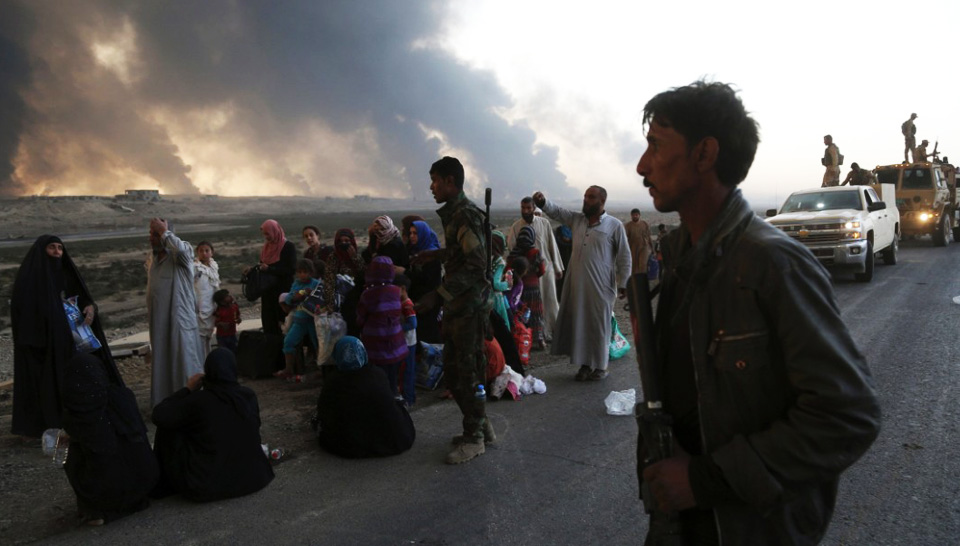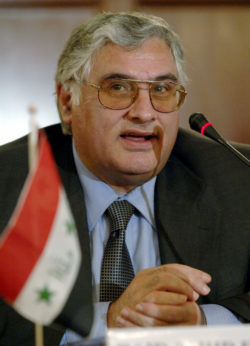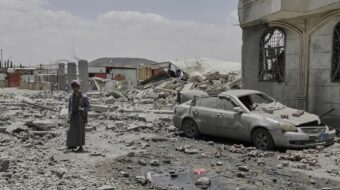
ISIS, also known as the Islamic State, appears to be on its last legs in Iraq. The Iraqi Army, joined by Kurdish forces and with U.S. air support, has launched a military offensive to retake Mosul, the country’s second largest city. A city of more than 2 million people, Mosul was seized by ISIS more than two years ago and is the group’s last remaining base in Iraq.
ISIS has been a regular feature in American headlines and is a theme of Donald Trump’s flag-waving, chest-thumping campaign. But it appears that most Americans are not that interested in either Iraq or ISIS these days. A September Gallup poll found only 1 percent of voters rated those topics as “important.” After all, hardly any U.S. “boots” are on the ground there.
But does the decline of ISIS matter? What is ISIS, actually? And, does Iraq matter for the U.S. anymore? We wanted to get the view from Iraq, so we posed these and other questions to Raid Fahmi, a veteran Iraqi activist and scholar. Below is the first part of his response. We’ll share more of our conversation with him on PeoplesWorld.org in the weeks to come.
About our interviewee: Raid Fahmi, 66, joined the Iraqi Communist Party at the age of 21. He was forced to leave Iraq in late 1978 because of Saddam Hussein’s campaign of repression against communists and democrats of any type. He lived in exile, first in Kuwait for four years, and then in France for 23 years. While in exile, he earned a bachelor’s and master’s degree from the London School of Economics and Queen Mary College, University of London, respectively, and a doctorate in Development Economics from the Sorbonne, where he also taught economics.
He remained in close contact with political movements in his home country, and after the fall of Saddam Hussein, returned to Iraq. Since then he has played a leading role in the Iraqi struggle for sovereignty and democracy. He was Iraq’s Minister of Science and Technology from 2006 to 2010. He is currently a top leader of the Iraqi Communist Party, serving as assistant secretary of the party’s Central Committee, and is a leading activist in the democratic movement that has surged throughout the country over the past year and a half. Fahmi is married and has four adult children. He lives in Baghdad.
Here’s part one of our interview, conducted via email in early October:
PW: What is the meaning of ISIL/ISIS/Daesh? Who is behind it? Why has it been able to continue to operate with seeming impunity?
RF: ISIL is the acronym of “Islamic State in Iraq and the Levant,” used by UN and U.S. officials, while ISIS is the acronym of “Islamic State in Iraq and Syria” or “in Iraq and al-Sham.” This inconsistency lies in the translation of the Arabic word “al-Sham.” It can be translated variously as “the Levant,” “Greater Syria,” “Syria” or even “Damascus,” and in the time of the rule of the first Muslim Caliph in the 7th century, it described the area between the Mediterranean and the Euphrates River, Anatolia (in present-day Turkey) and Egypt. After World War I, the colonial powers used it for the area comprising what is now Syria, Jordan, Lebanon, Israel, the Palestinian Territories, and part of southeastern Turkey.
Daesh is an Arabic acronym formed from the initial letters of the group’s name in Arabic. Although Daesh has no particular meaning in Arabic, it is used widely with pejorative overtones. The term Daesh came to be used by European and American officials after French President Francois Hollande used it in September 2014 after the terrorist attacks in Paris.
To resume the history of these appellations: this group was initially known as Jama’at al-Tawhid wal-Jihad (Unity and Jihad), then changed to al-Qaeda in Iraq (AQI) after pledging allegiance to Osama bin Laden’s network in October 2004.
Since then, it has operated under different guises until its current leader, Abu Bakr al-Baghdadi, declared it the Islamic State in Iraq (ISI) in 2006, adding the “and al-Sham” to make “ISIS” in 2013. In June 2014, al-Baghdadi announced that it should be referred to henceforth as the Islamic State (IS) in recognition of its self-declared caliphate. The astonishingly rapid ascent of Daesh since 2013, to the extent that by the end of 2015 it held under its control swathes of territories in Syria and Iraq greater in physical size than the UK, continues to raise serious questions about the secrets of its strength. It is commonly accepted that such a meteoric rise is not conceivable without support from state secret services.

PW: How do you assess current U.S. policy and actions with regard to Iraq, as well as Syria, Saudi Arabia, Iran, and the region as a whole?
RF: What is factually proven is that al-Baghdadi and many other leaders of Daesh were U.S. Army detainees. Official U.S. Army records identify the capture of al-Baghdadi in Fallujah in Feb. 2004, and the date of his release as Dec. 8, 2004. He was confined, with other future terrorist leaders, in the prison facilities of Camp Bucca in the south of Iraq.
It is also established that between 2013 and 2015, Daesh extended its control over wide areas in Syria and Iraq without effective reaction from U.S. and allied forces until late in 2015. President Obama admitted in an interview that U.S. Army intelligence was following the movements of Daesh in the desert between eastern Syria and western Iraq, but did not intervene so as not to strengthen the position of then-Iraqi Prime Minister Nouri al-Maliki! The same line of reasoning seems to have led some U.S. strategists to use or instrumentalize local terrorist groups to achieve U.S. political strategic objectives.
Certain unveiled secret dispatches from the Pentagon support the claim that Western countries, Turkey, and some of the Gulf countries lent direct and indirect support to the al-Qaeda in Iraq (AQI) plan to seize the eastern part of Syria, leading to the creation of Daesh. Most of the Daesh armament is of American origin. The weapons received by Daesh were those that were meant be delivered to the so-called “moderate” Syrian opposition but fell eventually into the hands of al-Qaeda and Daesh. After its occupation of the Iraqi cities of Mosul in June 2014 and Ramadi later, Daesh came into possession of huge quantities of heavy armament, including American tanks and armored vehicles, left by the Iraqi army.
Before it gained control of large swathes of Syrian and Iraqi territories and the oil wells in these areas, Daesh benefitted from private donations from Qatar and Saudi Arabia and from the logistical support provided by Turkey, which continues up to now.
Al-Qaeda and later Daesh have received support from various regional powers at different periods for specific political and security considerations. Terrorists were allowed to pass into Iraq through the territories of certain neighboring countries and launch terrorist operations in Iraq in order to head off the threat that the presence of American and allied forces in Iraq may represent to the regimes in the region.
PW: What strategic interests do Daesh and other terrorist groups serve?
RF: Terrorist groups, including Daesh, by means of their unbridled barbarous methods and fanatic behavior, play a major subversive role in destabilizing and weakening the national states of the region, exacerbating sectarian and ethnic conflicts, producing massive internal displacement of population resulting in effectual sectarian and ethnic cleansing. Hence they are creating a de facto relocation of the population in homogeneous sectarian and ethnic regions.
The induced heightened inter-communal conflicts and tensions, more fragile national central states, riddled by widespread corruption and internal rifts, coupled with increased legalized international armed intervention, create the conditions for implementing plans for breaking up the national states in the region, either into small independent states for the various ethnic and religious communities, or more likely into weakly-knit federative states with small central governments and strong autonomous ethnically or confession-based regions.
Iraq will be confronted by these serious challenges in the post-Daesh period.
I have dwelt mainly on the external factors behind the emergence of Daesh and other terrorist organizations. I should however emphasize also that Daesh and other terrorist outfits are not strictly external creations. There are also equally strong internal, national, and local factors that nourish extremism, and provide a receptive environment for the discourse of the extremist and terrorist organizations.
Starting with the beginning of this year, the military balance of power tilted in favor of U.S./coalition forces and the Iraqi armed forces, supported by the Kurdistan region peshmergas and “popular mobilization” armed formations. Over the past few months, several cities were liberated from Daesh, including its stronghold Fallujah, and the military preparations have reached an advanced stage for the decisive battle of Mosul. [Editor’s Note: The battle to retake Mosul was launched on October 17, 2016, just after this interview was conducted.] It is estimated that more than 50 percent of the Iraqi territories controlled by Daesh have been liberated.
This change in the military situation in the war against Daesh is partly due to a greater and more effective participation of the U.S. and coalition forces in the military operations, either through more airstrikes or providing more effective training, advice, and intelligence information to the Iraqi forces, and probably more direct involvement in certain special operations.
The military stand reflects a change in U.S. policy towards Daesh from one of containment by limited air strikes to a policy aimed at defeating it and driving it out from Iraq. This evolution in U.S. and European policy came after the deadly terrorist attacks claimed by Daesh that hit Paris, Brussels, and the U.S. over the past year.
Daesh will most probably be defeated militarily in Iraq in the coming weeks. It is less likely to suffer a similar defeat in Syria though it will be pushed back from territories it occupied. But the stand of the U.S. and its allies toward terrorist organizations is more ambiguous. The attitude towards Jabhat al-Nusra, Fath al-Sham, and other similar organizations that have support from Turkey and Saudi Arabia, seems to indicate a concern that they should receive a different treatment than that of Daesh, because they are considered to be still useful in the battle against the Syrian regime. This explains to a large extent the discord between Russia and the U.S.
The military defeat of Daesh is a necessary condition for finishing off the terrorist organizations, but it is not sufficient. The fight against Daesh and terrorism has several dimensions. Besides the military aspect, there are the security and political aspects and the field of ideas. Unless all these aspects are properly and duly addressed, the terrorist threat will remain. The post-Daesh period will depend upon the policies, measures, and strategies that will be pursued and implemented to address these challenges.
This interview will be continued in a future installment at PeoplesWorld.org.











